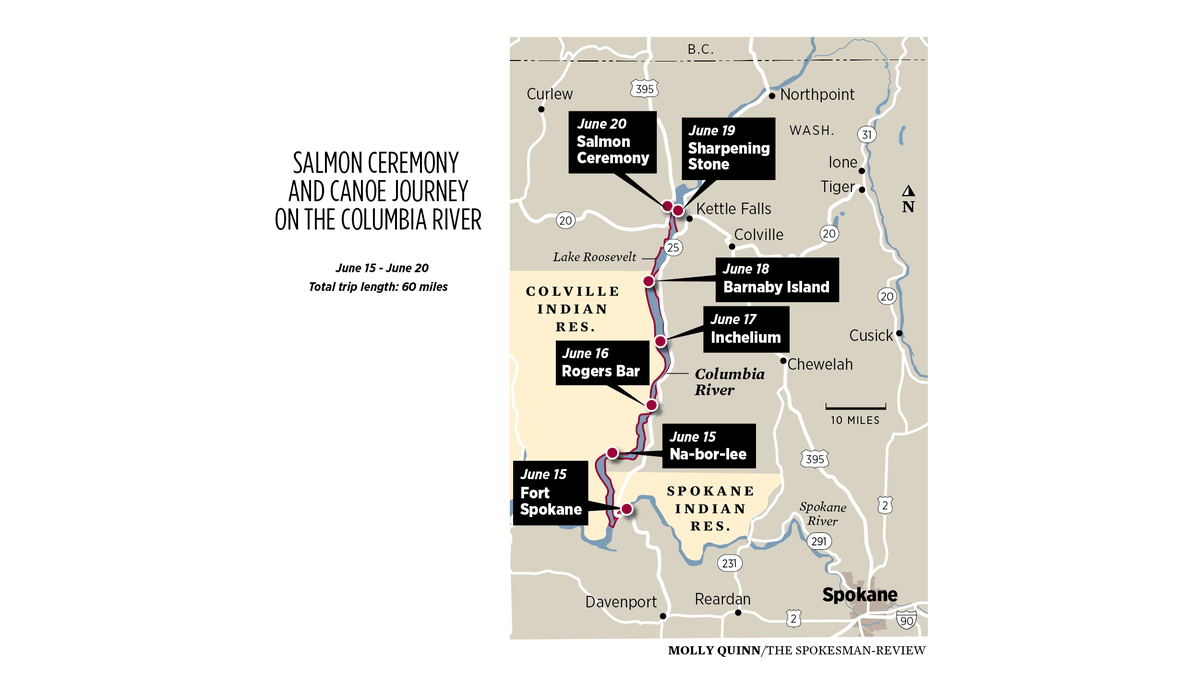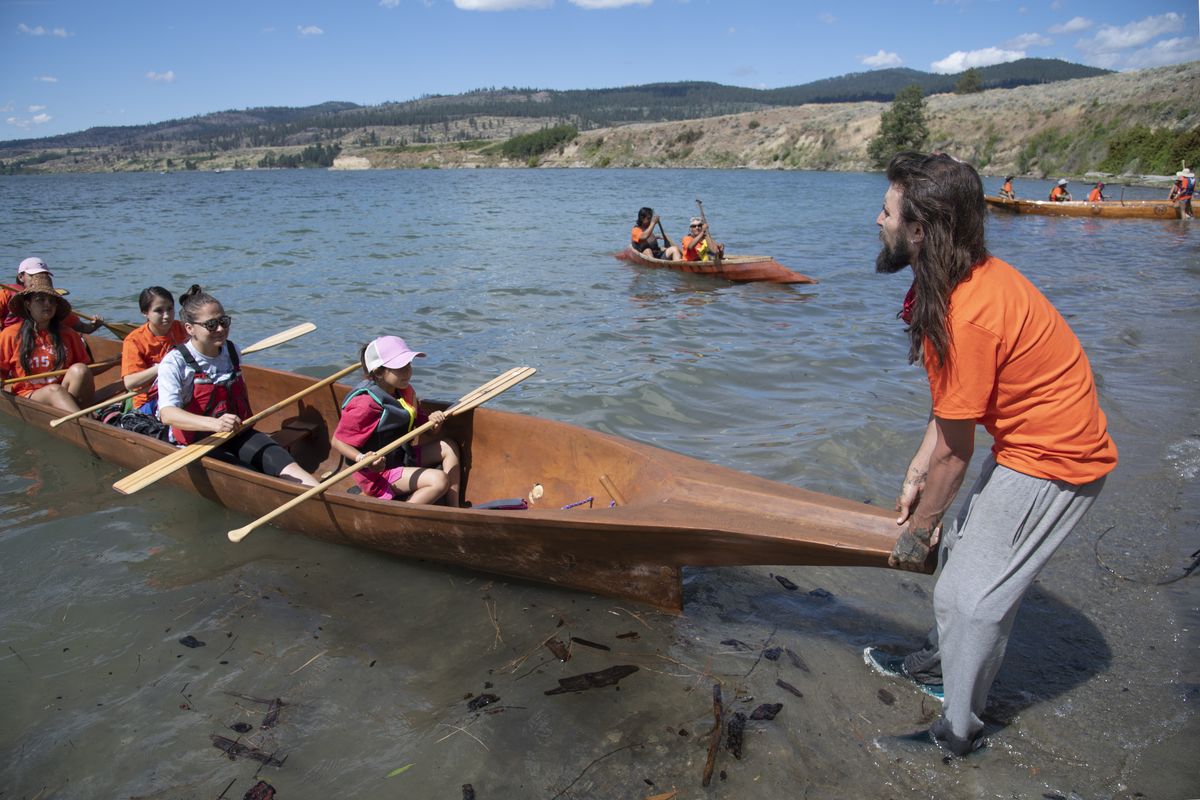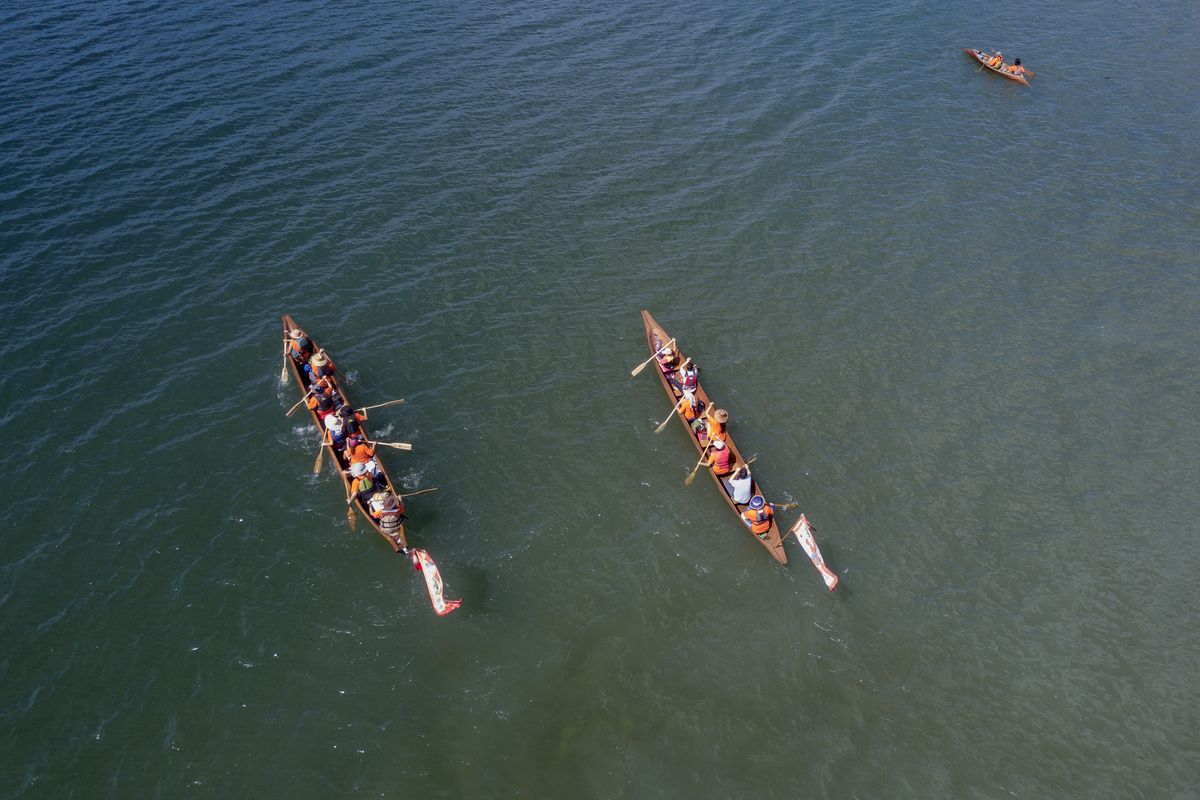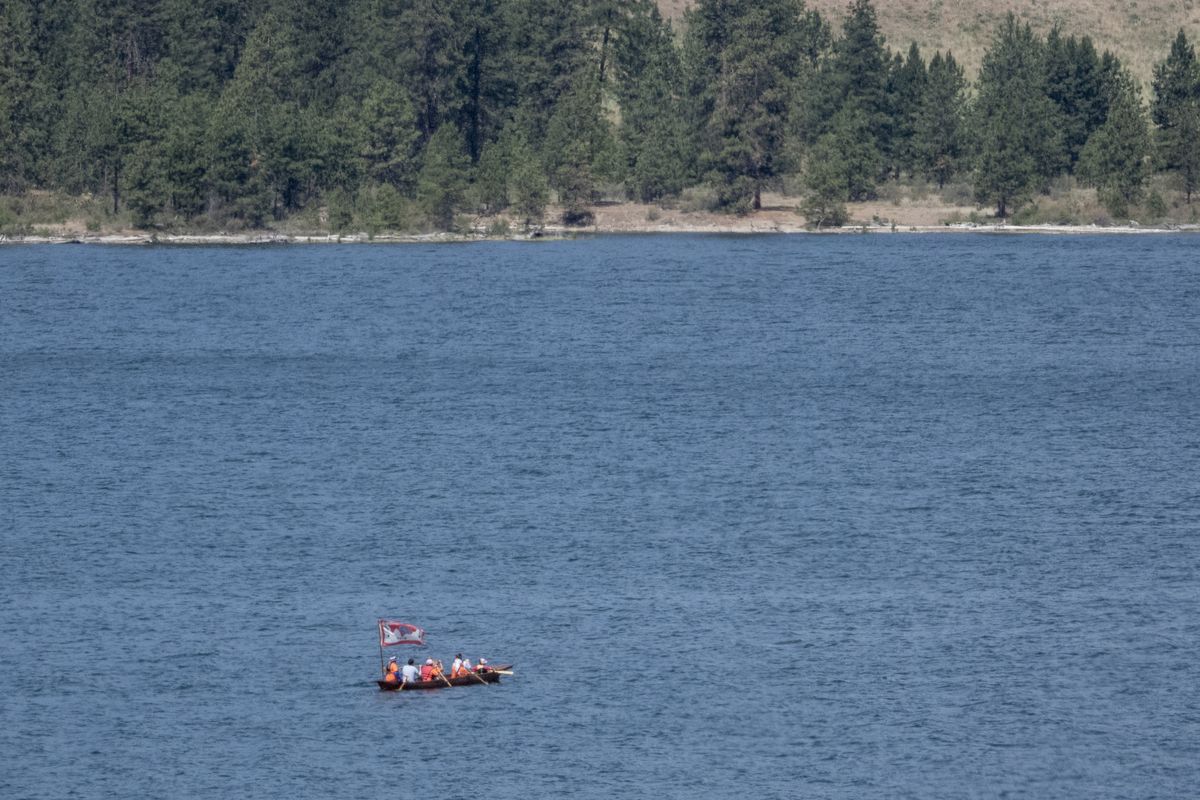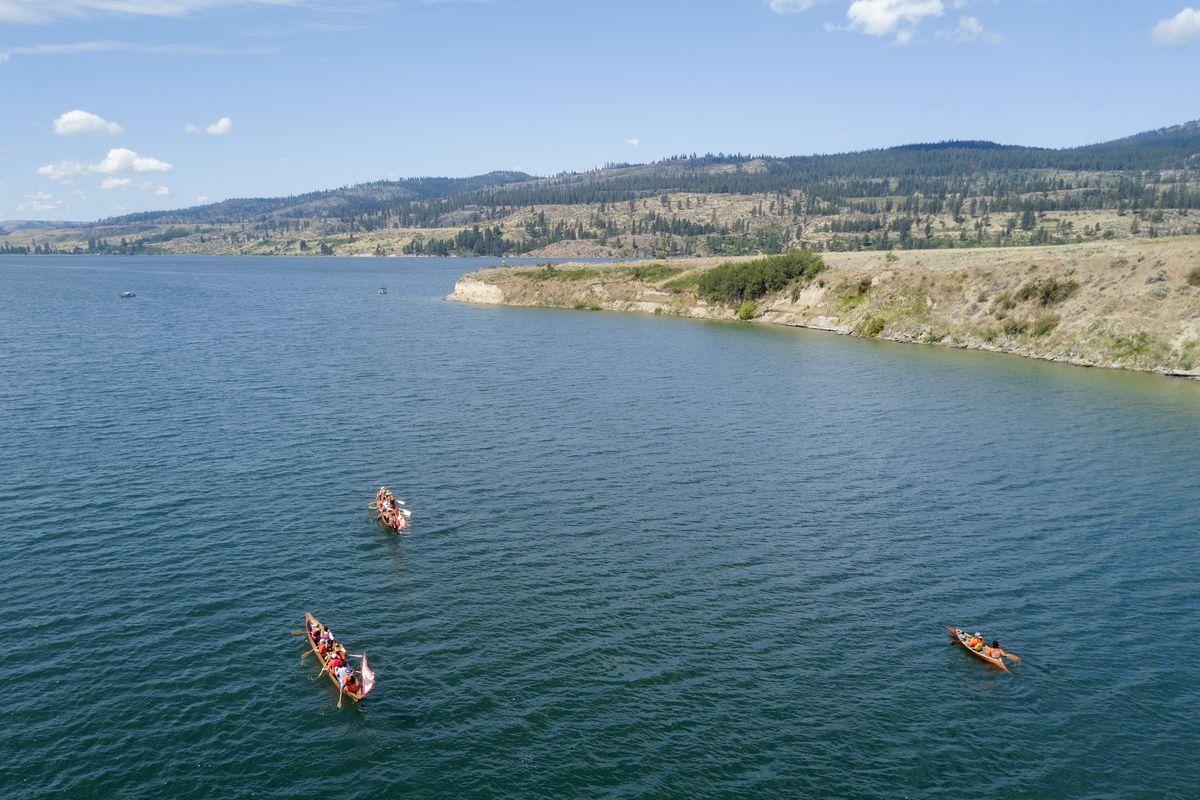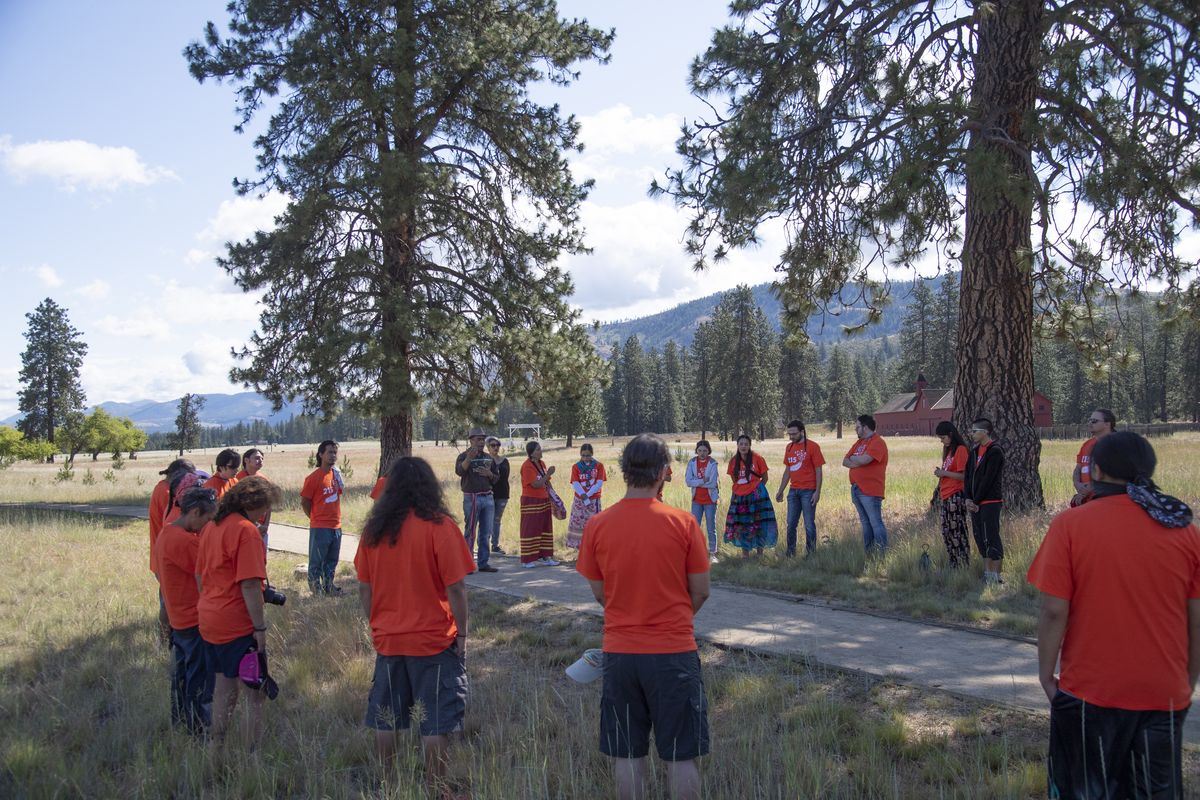‘It’s time to bring them back’: Tribes’ canoe journey calls attention to loss of salmon, legacy of residential schools
Devon Peone helps launch one of two traditional cedar canoes Tuesday as they prepare to leave the confluence of the Spokane and Columbia (Jesse Tinsley/The Spokesman-Review)Buy a print of this photo
FORT SPOKANE – They may have been paddling upstream, but the wind was at their backs.
Their hand-carved cedar canoes may have weighed 800 pounds and stretched 31 feet in length, but they moved easily through the waters of the Columbia River.
The salmon may have been barred from those waters some 80 years ago, but the Spokane and Colville tribal members who began the six-day, 60-mile journey from Fort Spokane to Kettle Falls on Tuesday morning believe schools of salmon will one day follow them along the same route.
And while colonialist forces have worked, sometimes brutally, to strip them of their native language, they counted their strokes in Salish, made jokes in Salish and sang in Salish as they paddled between the reservations they were allotted when their ancestral territories were taken.
Two traditional cedar canoes and a smaller two-person canoe paddle near the confluence of the Spokane and Columbia Rivers Tuesday, June 15, 2021 on a trip to learn about their tribes’ history in the area while on a four-hour paddle up the Columbia. They met at nearby Fort Spokane, a military post founded in 1880, but it was also a school to educate Native kids, a process which was not always voluntary. (Jesse Tinsley/The Spokesman-Review)Buy a print of this photo
The group of some 40 Spokane and Colville tribal members confronted the cruelty of their history before they launched, gathering in a circle on the grounds of Fort Spokane, once home to a government-run boarding school where they were stripped of their culture and subjected to cruelty, according to Sulustu, whose English name is Barry Moses and who addressed those assembled.
“This was basically like a concentration camp for kids,” Sulustu said.
Indigenous people have long attempted to draw attention to the inhumanity of their often forced education in such schools, but the issue came to renewed attention last month, when the remains of more than 200 children were discovered at the site of a residential school in Kamloops, British Columbia.
“And I’m sure if we were to look at all the other schools,” Sulustu said, “we’d find many, many more.”
He called for such searches to be conducted and for any remains to be returned to the tribes.
“It’s time to bring them back,” he said.
It is also time, according to Sulustu, to restore what the schools sought to eliminate.
“If there’s any greater act of resistance,” he said, “then it’s learning our languages.”
Evidence of such resistance was on display everywhere as the group headed to the north side of the Spokane River and prepared to begin their journey north to an annual salmon ceremony slated for Sunday near the site of the now-submerged Kettle Falls, using their languages to speak in both snippets and extended exchanges.
“During the canoe journey, we try to use our language as much as possible,” said Craig Hill, the 22-year-old making his maiden voyage as skipper of the Spokane tribe’s canoe.
Devon Peone, who teaches at the Spokane Language House in Wellpinit, used English, however, to explain the origin of the fifth annual canoe journey.
He said an important impetus was Virgil Seymour, a Colville tribal elder from the Sinixt band who “had a vision of people paddling to the salmon ceremony” but died just before the first one took place in 2016.
Also important, Peone said, was the donation of the cedar logs that “grew for over 700 years on the Quinault reservation” before being carved by the individual tribes of the area.
The journey has persisted, Peone said, because it offers an opportunity for “reconnection and revitalization.”
“It’s important to reconnect to the water, the land, the elders, but also to call the salmon home,” said Peone, who organizes the Spokane tribe’s canoe and often serves as its skipper. “But we need a good, clean home for the salmon to come home to.”
The tribes have been making strides toward that goal.
Late last year, Colville tribal biologists observed the first spawning chinook salmon in the Upper Columbia river system in a generation. This spring, Spokane tribal biologists found a newly hatched salmon in Tshimakain Creek, also spelled Chamokane Creek, on the eastern edge of the Spokane Indian Reservation.
Even so, major challenges remain to restore historic salmon runs, most significantly the dams that impound the Columbia and prevent the fish from moving up and downstream.
Shelly Boyd, a Sinixt who skippered the boat from her tribe, said those obstacles can be overcome.
“The whole point is, we’re going to bring the salmon back,” she said. “They’re coming right after us.”
Boyd, though, emphasized that the journey was about more than “just the hard things.”
It was also about the simple act of getting out on the water on a sunny day, stopping on beaches and islands, swimming and talking.
Even so, Boyd said the journey offered an opportunity for members of Indigenous communities – and those outside them – to reflect on how a paddle that begins at the site of a former residential boarding school and continues up a dammed body of water fits within a broader context.
“It’s hard for us to recognize the things right in front of us,” she said. “Look at the river. Look at Fort Spokane. Look at the Indigenous people in front of us.”

